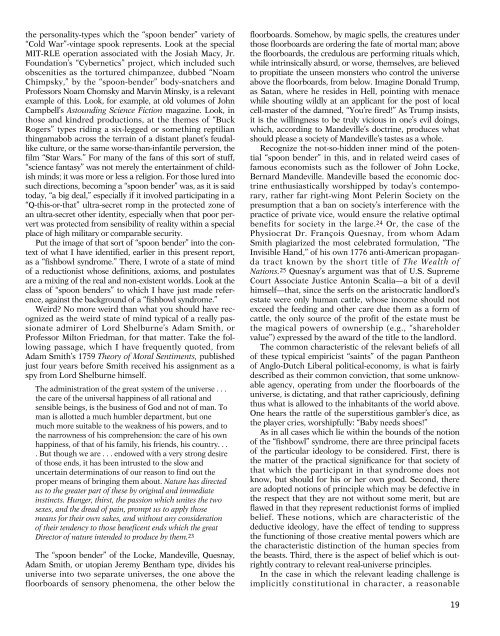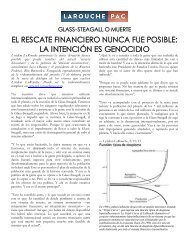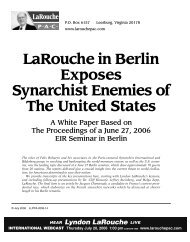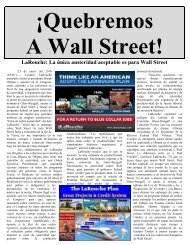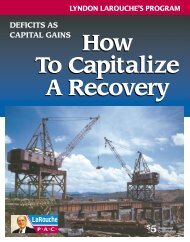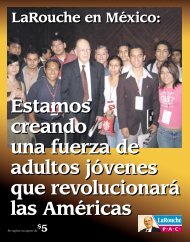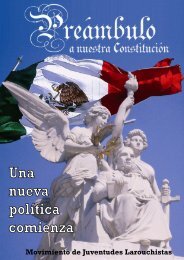Spoon-Benders - LaRouche - LaRouchePAC
Spoon-Benders - LaRouche - LaRouchePAC
Spoon-Benders - LaRouche - LaRouchePAC
Create successful ePaper yourself
Turn your PDF publications into a flip-book with our unique Google optimized e-Paper software.
the personality-types which the “spoon bender” variety of<br />
“Cold War”-vintage spook represents. Look at the special<br />
MIT-RLE operation associated with the Josiah Macy, Jr.<br />
Foundation’s “Cybernetics” project, which included such<br />
obscenities as the tortured chimpanzee, dubbed “Noam<br />
Chimpsky,” by the “spoon-bender” body-snatchers and<br />
Professors Noam Chomsky and Marvin Minsky, is a relevant<br />
example of this. Look, for example, at old volumes of John<br />
Campbell’s Astounding Science Fiction magazine. Look, in<br />
those and kindred productions, at the themes of “Buck<br />
Rogers” types riding a six-legged or something reptilian<br />
thingamabob across the terrain of a distant planet’s feudallike<br />
culture, or the same worse-than-infantile perversion, the<br />
film “Star Wars.” For many of the fans of this sort of stuff,<br />
“science fantasy” was not merely the entertainment of childish<br />
minds; it was more or less a religion. For those lured into<br />
such directions, becoming a “spoon bender” was, as it is said<br />
today, “a big deal,” especially if it involved participating in a<br />
“Q-this-or-that” ultra-secret romp in the protected zone of<br />
an ultra-secret other identity, especially when that poor pervert<br />
was protected from sensibility of reality within a special<br />
place of high military or comparable security.<br />
Put the image of that sort of “spoon bender” into the context<br />
of what I have identified, earlier in this present report,<br />
as a “fishbowl syndrome.” There, I wrote of a state of mind<br />
of a reductionist whose definitions, axioms, and postulates<br />
are a mixing of the real and non-existent worlds. Look at the<br />
class of “spoon benders” to which I have just made reference,<br />
against the background of a “fishbowl syndrome.”<br />
Weird? No more weird than what you should have recognized<br />
as the weird state of mind typical of a really passionate<br />
admirer of Lord Shelburne’s Adam Smith, or<br />
Professor Milton Friedman, for that matter. Take the following<br />
passage, which I have frequently quoted, from<br />
Adam Smith’s 1759 Theory of Moral Sentiments, published<br />
just four years before Smith received his assignment as a<br />
spy from Lord Shelburne himself.<br />
The administration of the great system of the universe . . .<br />
the care of the universal happiness of all rational and<br />
sensible beings, is the business of God and not of man. To<br />
man is allotted a much humbler department, but one<br />
much more suitable to the weakness of his powers, and to<br />
the narrowness of his comprehension: the care of his own<br />
happiness, of that of his family, his friends, his country. . .<br />
. But though we are . . . endowed with a very strong desire<br />
of those ends, it has been intrusted to the slow and<br />
uncertain determinations of our reason to find out the<br />
proper means of bringing them about. Nature has directed<br />
us to the greater part of these by original and immediate<br />
instincts. Hunger, thirst, the passion which unites the two<br />
sexes, and the dread of pain, prompt us to apply those<br />
means for their own sakes, and without any consideration<br />
of their tendency to those beneficent ends which the great<br />
Director of nature intended to produce by them. 23<br />
The “spoon bender” of the Locke, Mandeville, Quesnay,<br />
Adam Smith, or utopian Jeremy Bentham type, divides his<br />
universe into two separate universes, the one above the<br />
floorboards of sensory phenomena, the other below the<br />
floorboards. Somehow, by magic spells, the creatures under<br />
those floorboards are ordering the fate of mortal man; above<br />
the floorboards, the credulous are performing rituals which,<br />
while intrinsically absurd, or worse, themselves, are believed<br />
to propitiate the unseen monsters who control the universe<br />
above the floorboards, from below. Imagine Donald Trump,<br />
as Satan, where he resides in Hell, pointing with menace<br />
while shouting wildly at an applicant for the post of local<br />
cell-master of the damned, “You’re fired!” As Trump insists,<br />
it is the willingness to be truly vicious in one’s evil doings,<br />
which, according to Mandeville’s doctrine, produces what<br />
should please a society of Mandeville’s tastes as a whole.<br />
Recognize the not-so-hidden inner mind of the potential<br />
“spoon bender” in this, and in related weird cases of<br />
famous economists such as the follower of John Locke,<br />
Bernard Mandeville. Mandeville based the economic doctrine<br />
enthusiastically worshipped by today’s contemporary,<br />
rather far right-wing Mont Pelerin Society on the<br />
presumption that a ban on society’s interference with the<br />
practice of private vice, would ensure the relative optimal<br />
benefits for society in the large. 24 Or, the case of the<br />
Physiocrat Dr. François Quesnay, from whom Adam<br />
Smith plagiarized the most celebrated formulation, “The<br />
Invisible Hand,” of his own 1776 anti-American propaganda<br />
tract known by the short title of The Wealth of<br />
Nations. 25 Quesnay’s argument was that of U.S. Supreme<br />
Court Associate Justice Antonin Scalia—a bit of a devil<br />
himself—that, since the serfs on the aristocratic landlord’s<br />
estate were only human cattle, whose income should not<br />
exceed the feeding and other care due them as a form of<br />
cattle, the only source of the profit of the estate must be<br />
the magical powers of ownership (e.g., “shareholder<br />
value”) expressed by the award of the title to the landlord.<br />
The common characteristic of the relevant beliefs of all<br />
of these typical empiricist “saints” of the pagan Pantheon<br />
of Anglo-Dutch Liberal political-economy, is what is fairly<br />
described as their common conviction, that some unknowable<br />
agency, operating from under the floorboards of the<br />
universe, is dictating, and that rather capriciously, defining<br />
thus what is allowed to the inhabitants of the world above.<br />
One hears the rattle of the superstitious gambler’s dice, as<br />
the player cries, worshipfully: “Baby needs shoes!”<br />
As in all cases which lie within the bounds of the notion<br />
of the “fishbowl” syndrome, there are three principal facets<br />
of the particular ideology to be considered. First, there is<br />
the matter of the practical significance for that society of<br />
that which the participant in that syndrome does not<br />
know, but should for his or her own good. Second, there<br />
are adopted notions of principle which may be defective in<br />
the respect that they are not without some merit, but are<br />
flawed in that they represent reductionist forms of implied<br />
belief. These notions, which are characteristic of the<br />
deductive ideology, have the effect of tending to suppress<br />
the functioning of those creative mental powers which are<br />
the characteristic distinction of the human species from<br />
the beasts. Third, there is the aspect of belief which is outrightly<br />
contrary to relevant real-universe principles.<br />
In the case in which the relevant leading challenge is<br />
implicitly constitutional in character, a reasonable<br />
19


